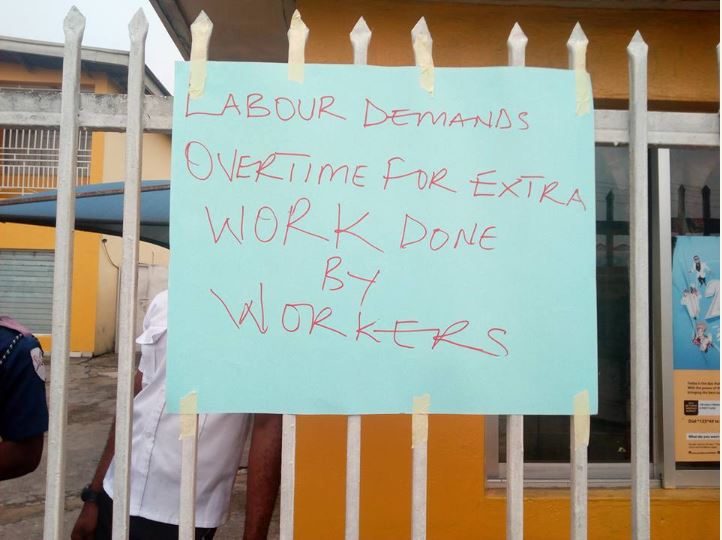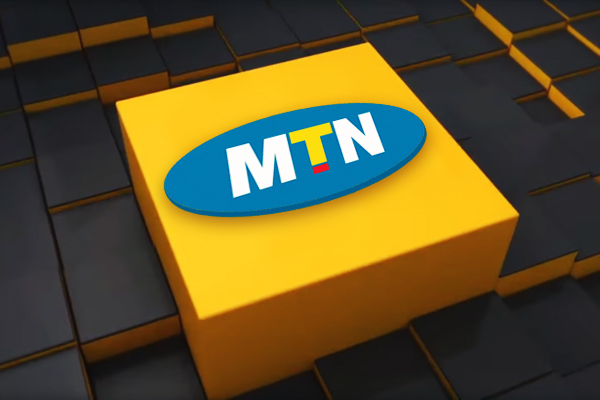Business
With Ndukwe leading MTN Board, new phase of competition begins
Published
7 years agoon
By
Olu Emmanuel
Mostly, in this part of the world, we borrow words to dress up epitaphs as befitting honorifics for the departed. Perhaps, like the horseman in Wole Soyinka’s Death and the King’s Horseman that ferries the king to his final place of rest, we sometimes think that words and more words, will provide the needed comfort and cushioning for the departing soul. We have too many beautiful words for the dead while paying scant attention to the achievements of the living.
This is why the announcement penultimate week of Engr Ernest Ndukwe as the new chairman of the MTN Board is such a salutary break in tradition. The announcement is a seismic corporate decision that could have transformative effects on the entire industry, beyond the fortunes of MTN. To be frank MTN announced an intimidating stellar cast of directors to superintend its affairs going forward. And the euphoria was instantaneous for very obvious reasons.
This is what makes the story interesting and very profound. In announcing Engr Ndukwe as the new chair from September 2, 2019, MTN also released the names of two independent non-executive directors and five others as non-executive directors. The independent non-executive directors are: Michael Onochie Ajukwu, a star performer with an enviable record in the banking sector; and Muhammad K. Ahmad, a former director of the Nigerian Deposit Insurance Company (NDIC) and a pioneer director of the National Pension Commission (PENCOM).
The non-executive directors include: Andrew Alli, Omobola Johnson, A. B. Mahmoud and Ifueko Okauru. Other members of the new board are: Rhidwaan Gasant, Ralph Mupita, Paul Norman, Jens Shulte-Bochum, Rob Shuter and Karl Toriola. If the old cliché is acceptable, each name strikes a gong, and, if you want to extend it further, each name carries enough firepower to over-awe the corporate sector. This might be hyperbole in the extreme. An explanation might save the situation, however.
Flash back to the year 2000. At the dawn of democracy in 1999, after the blighted years of the military, President Olusegun Obasanjo had decided on the telecommunications sector as one area to chance on in order to promote growth and development. In diverse fields he was looking for personalities with bold faces and significant networth who could take decisions that can hurt in the interim but progressively developmental on the long run.
The telecommunications sector was particularly mired in failure and controversy with a particular government official acquiescing in negligent failure that telephones were not for the poor. So while service to the people had been denominated to only the rich, the poor as far as telecommunications services were concerned, were beginning to admit their fate of abandonment as a natural state of being. The Obasanjo administration was determined to address the situation and needed a determined mind to work with.
Entered Engr Ernest Ndukwe whose name had been embedded in much of the country’s telecommunications history, being a frontline driver of the private sector and promoting non- governmental opportunities for the industry to awaken. He was the one tapped by Obasanjo to head the regulatory agency, the Nigerian Communications Commission, whose effective operation would unlock the opportunities latent in the sector.
He was a perfect pick, and his early activities, like most others that would signpost his time at the NCC, instigated excitement and demonstrated the kind of success possible when an organization is backed by government powers. Like his height which has refused to bow to age, Engr Ndukwe can set very tall targets for himself and challenge his workforce with those targets. Part of his immediate assignment was to build a team. In just over ten years, he built that team, a solid a human capital base that has formed the superstructure of a regulatory agency that for years, was one of the best in the world, always singled out for recognition at global telecom fora. Nigeria was seen as a country where the laws supported local and international investment. The industry grew exponentially, leading to a democratization of phone ownership. The ordinary fellas have been given an opportunity to speak, being owners of those tools, even better ones, than previous governments had kept away from them. For anybody who could deliver the country from a protracted telecommunications shame, one reward awaited him: star status. Engr Ndukwe got just that. His name became a household name across the land, and his grey hair distinguished his ever smiling face on television and in the newspapers. As they say, every good thing comes to an end. Although good deeds don’t. He has been a free agent, to use football language. But almost ten years hence, his good works cannot give him a hiding. He earned his name, Mr. GSM. I hope he carries it in his rubric.
There were star personalities that worked with President Obasanjo. Ifueko Okauru was one of them. Before joining the Federal Inland Revenue Service (FIRS), the organization had the reputation that could rival the tax collectors in the holy book who had all kind of tricks to play with public funds. Like Ndukwe at the NCC, Okauru turned the fortunes of that agency around, to the extent that it became one of the primary hunting grounds for job seekers. In terms of revenue generation, FIRS was on the front seat, and Okauru was the one supplying the fuel responsible for the speed. Since her tenure came to a close in 2012, she has never lacked something to do. Her track record precedes every of her step.
As Minister of Communication Technology, those who were fortunate to move around the world with Mrs. Omobola Johnson savoured the joy of a senior government personality properly placed in office based on competence and experience. It was infectious to watch her speak extempore on very serious and complicated technology issues. But, of course, she was living her dream and having fun while impacting on lives and generations. She had worked with Author Anderson Consulting (now known as Accenture) in the UK, and was the company’s Country Managing Director in Nigeria. Johnson had been prepared to face the world and solve complicated issues of development.
By way of international approval of her vision for development, Nigeria, at the ITU Plenipotentiary in Busan, South Korea, received the GEM Tech award, after emerging from about 37 finalists shortlisted from about 360 entries from 74 countries of the world. And she capped it in style.
Climbing down from the stage after receiving the award on behalf of her country, Johnson told the international media: “We are committed to getting more women and girls into ICTs. It is critical to get our girls to adopt ICTs so that they are not left behind in the digital revolution changing communities and nationals across the globe.”
Omobola carried quality content and confidence in her frame and left very memorable footprints on the canvass of the telecommunications industry.
The first time I was to get any information about Andrew Alli was a couple of years back when a friend put a call across from the UK asking when I saw him last. Not since that fateful day in 1989, I told him. “That guy is doing great things in the financial sector,” he informed. The question stirred some great memories of yore. One fateful day, towards the end of 1989, as a curb reporter getting into the flagship, The Guardian, I was given the cherished opportunity of covering the celebratory apotheosis of a man whose education policy as the Executive Governor of Bendel State (now Edo and Delta States) had substantially assisted my indigent self to complete my university education. What I remember very vividly is the picture of a very young boy being able to weather the weight of that occasion with admirable equanimity, and the words of the king of that kingdom, Ekpoma, His Royal Highness, Anthony Akhimien Abumere, floating into the clouds of the ancient, “Do not say this has happened, and you want to abandon your people. We know you have the opportunity. But do not leave us. We will always be there for you.”
Now Andrew is back, ready and reinforced to embrace ambitious challenges that often translate into opportunities in any developing environment.
One would draw blank on A. B. Mahmoud but suffice to observe here that it is not a world of beverages when you are a Managing Partner of the law firm of Dikko & Mahmoud and sit on the board of so many organisations, including Stanbic IBTC Managers and Aliko Dangote Foundation.
Just a little sampling of some of the personalities MTN has gathered for the new board, whose precise bio details were carefully served by way of sending a coded message which I will proceed to explain based on my little odyssey in the telecommunications industry.
My first observation is that by putting up this new board, MTN has put together an overwhelming but diverse industry experience that can cause transformative disruptions in any industry. While this point would eventually be attended to, let me add that having had some brushes with the Nigerian authorities over regulatory issues resulting in a hefting fine at a time, MTN has given a signal that they want to get it right. From the composition, it seems that going forward, financial fidelity and transparency will form the catch phrase.
The foremost service provider may also have decided to lead from the front and provide exemplary industry paradigms that others may want to emulate. There is enough maturity and industry experience to initiate actions and programmes that will spur their competitors into doing something to their operations.
We have also been overly excited and enthusiastic about landmark achievements in telecommunications service deployment as a country. There is nothing wrong with such rodomontade claims. By June this year, the number of phone subscriptions hovered at over 174m, while data subscription has quickly risen to over 122m, boosted by expanded capacity by the network operators. While there are skirmishes with 4G services, the real deal down the line is 5G which apart from opening massive opportunities to wealth creation, will unleash such a cocktail of service delivery never before witnessed in human history. MTN seems to be fortifying its house to engage in the competition that is miles away with the knowledge that our industry is still very virgin.
Furthermore, there is an urgent need to be the industry good boy. By bringing together industry egg heads who are very vast in quality corporate endeavours, MTN is engaging a higher gear to embark on practices that will offer little headache to its primary regulator, the Nigerian Communications Commission (NCC) and other ancillary industry relationships, and issue a challenge to competition to do likewise or be stream-rolled in the days ahead.
We have said variously that the strength of the country is resident in the abundant human capital and less on that black stuff, a receding product in the face of technology, which still bankrolls the country’s budget. While we pay lip service to this claim, MTN has come out very boldly to tap some of the best we have. And is there any grumbling going on! We wear diamond in our cloth and have little idea what it is.
Engr Ndukwe is an international personality. His voice can go very far, across the nations of the world. So is Omobola Johnson. So is Ifueko Omoigui-Okauru. And the others including – Alli and Mahmoud.
With the new Board, headed by Engr Ndukwe, MTN has put together a lethal strike force to hit the next phase of competition. MTN has taken some of the best of our land by way of announcing to the world that it has a new plan for the Nigerian market.
Competition can indeed be war and you have to throw everything at it. Remember those fiery words by Ogunmola to Kurunmi in the eponymous work, Kurunmi, by Prof Ola Rotimi of blessed memory. “This is war, brother. In war everything goes.”
But the new Board of MTN is not everything. It is one of the very best of the land, the highest quality of cast a stage director can possibly put together. It is a very positive move that can help reconfigure competition in the telecommunications industry.
Mr Okoh Aihe writes from Abuja
You may like


MTN Nigeria denies strike notice by telecoms workers


NIN: MTN, Airtel, others to emerge biggest casualties if FG block SIM cards


MTN maintains momentum, leads Airtel, others in data subscription


MTN, FBN, others suffer loss as stock market loses N153.6bn


MTN Group to sell stake in Nigerian subsidiary


NCC fines Airtel, 3 others N2.9bn over infractions
Trending

 Health5 days ago
Health5 days agoDeclassified CIA memo explored concealing mind-control drugs in vaccines

 Entertainment1 week ago
Entertainment1 week agoSimi addresses resurfaced 2012 tweets amid online backlash

 Crime6 days ago
Crime6 days agoSenior police officers faces retirement after Disu’s appointment as acting IGP

 Education1 week ago
Education1 week agoPeter Obi urges JAMB to address registration challenges ahead of exams

 Health1 week ago
Health1 week agoNAFDAC issues alert on suspected revalidated SMA Gold infant formula

 Comments and Issues7 days ago
Comments and Issues7 days ago20 Critical Fixes to Save Nigeria’s Democracy from Electoral Fraud

 Football7 days ago
Football7 days agoMartínez ruled out of Everton clash with calf injury

 Latest6 days ago
Latest6 days agoICPC yet to respond to El-Rufai’s bail request as arraignment date looms

